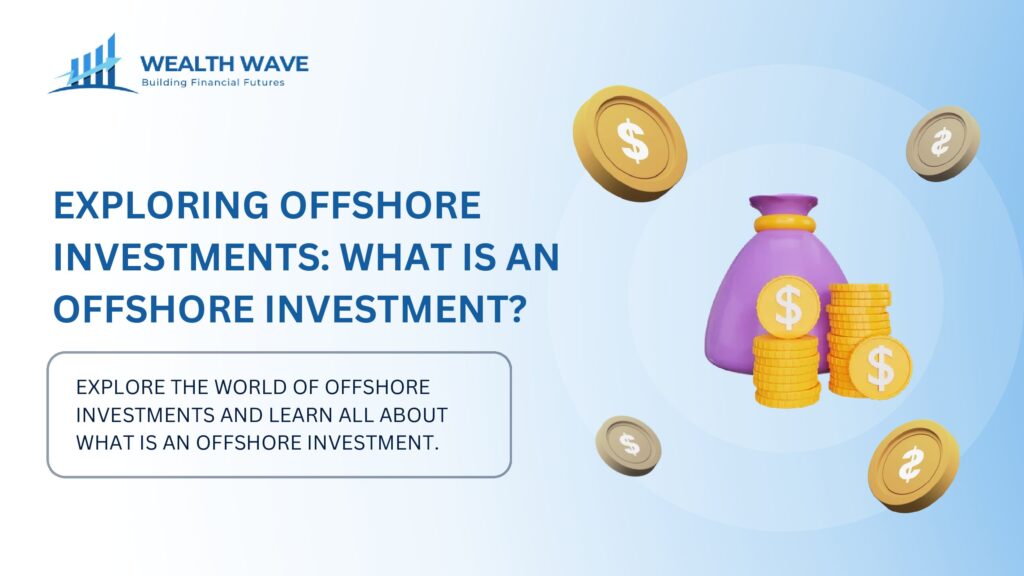Many people look for ways to grow their money. They want investments that can give them more for what they have saved. One way to do this is through offshore investing. But, what is an offshore investment? This kind of investment means putting your money in options outside your home country to gain benefits you might not find locally.
This blog will explore how offshore investing works, including its types and the differences from traditional investments. It also covers the good points and risks involved with such investments.
By understanding why people choose offshore finance, looking at tax savings, protecting assets, and spreading out investments, readers can see if it’s a fit for their goals. Dive into this journey of exploring international financial opportunities!
Key Takeaways
- Offshore investments put money in options outside your home country for benefits like less tax and more security.
- Types of offshore investments include foreign mutual funds, stocks, bonds, and real estate. They help spread out risk by investing in different countries.
- Before going offshore, consider costs and eligibility. Some places have minimum amounts for investing.
- Deposit protection varies by country but is key to keeping your money safe if a bank fails.
- Always choose a reliable institution for offshore investing and look into all options carefully. Getting advice from a professional can also help make better decisions.
Understanding Offshore Investing

Offshore investing refers to placing money outside of one’s home country. It includes various types of investments, such as foreign stocks and offshore accounts.
Definition

Offshore investing refers to using investment strategies outside an individual’s home country. This can include putting money into foreign companies or funds. Investors seek opportunities that may be unavailable in their own countries.
Offshore investments offer access to international markets and different currencies.
These investments provide benefits like tax optimization and asset protection. Investors can diversify their portfolios by exploring various sectors, businesses, and asset classes not found at home.
With offshore mutual funds, only non-U.S citizens can invest in professionally managed options registered outside the United States.
Types of offshore investments

Offshore investments come in several forms. They can include foreign mutual funds, stocks, bonds, and real estate. Offshore mutual funds are managed outside the United States and are available only to non-U.S. citizens.
These funds allow investors to access a wide range of international companies and sectors.
Investors also seek opportunities in offshore banking. This provides access to different currencies and financial markets. Additionally, investing in overseas companies can lead to diversification across various asset classes.
Each type of offshore investment offers unique benefits for tax planning and asset protection while expanding an investor’s portfolio beyond their home country.
Differences between offshore and traditional investments

Offshore investments differ from traditional investments in several ways. Traditional investments usually focus on the investor’s home country. These may include stocks, bonds, and real estate within familiar markets.
Offshore investing opens doors to opportunities beyond local borders. Investors can access foreign companies and funds not available at home.
Another key difference is tax advantages. Many offshore investment strategies offer tax optimization potential that traditional options do not provide. Asset protection is also more common in offshore setups, allowing investors to safeguard their wealth against local risks.
Currency diversification plays a significant role too, as it allows for investment across different currencies, boosting overall portfolio strength.
Benefits and risks
Offshore investments offer many benefits. They provide access to international markets and currency diversification. This allows investors to spread their money across different countries, sectors, and asset classes.
Such diversification can reduce risk and enhance returns. Offshore investments also have tax optimization potential for overseas funds or foreign companies.
There are risks involved with offshore investing as well. Regulations vary by country and can change often. Investors may face higher costs when setting up accounts abroad. Not every offshore opportunity is safe or legitimate, so careful research is essential before making decisions about an offshore portfolio.
The next section will explore why one might consider offshore investing further.
Why Consider Offshore Investing?

Offshore investing can offer significant tax advantages and help protect assets. It also allows for better diversification of wealth. These factors make it an attractive option for investors.
Curious about what offshore investments have to offer? Read on to learn more!
Tax advantages
Offshore investments can offer significant tax advantages. Many investors choose to place their money in tax havens. These locations often have lower or zero taxes on income, capital gains, and inheritance.
This setup can help maximize returns.
Investors may also benefit from tax optimization strategies through offshore structures. They can manage assets outside their home country for better planning. This approach helps protect wealth and reduce tax liabilities.
Offshore investment regulations vary by country but generally provide options for individuals looking to save on taxes while diversifying their portfolios.
Asset protection
Asset protection is a key benefit of offshore investments. This type of investing helps safeguard assets from risks such as lawsuits or creditors. By holding money and resources outside an individual’s home country, it reduces exposure to local legal actions.
Offshore investments also provide access to international markets. This allows investors to diversify their portfolios across different sectors and asset classes. Such diversity can further shield wealth from fluctuations in any single market.
Investing in foreign companies or funds adds layers of security for one’s assets while optimizing tax situations.
Diversification
Diversification is a key benefit of offshore investing. It allows investors to spread their money across different countries, sectors, and asset classes. This reduces risk by not putting all funds in one place.
Offshore investments give access to international markets and many currencies. Investors can choose from foreign companies or offshore mutual funds. These funds are managed outside the United States and available only to non-US citizens.
By diversifying their portfolios, investors can find more opportunities for growth and stability. They can take advantage of changes in global economies while protecting their assets at home.
This strategy enhances financial safety and potential returns in foreign investments. Next, it’s important to explore why one should consider investing offshore further.
Factors to Consider Before Investing Offshore

Investors should think about costs and fees before going offshore. They must also check if they meet the eligibility requirements for these investments.
Costs
Costs can vary when investing offshore. Fees may include setup costs, management fees, and performance fees. Investors should account for these expenses before making a decision. Offshore financial services often charge higher fees compared to traditional investments.
Additionally, currency exchange fees can apply when investing in foreign companies or funds.
It is essential to consider the total cost of an investment. Clear understanding of these costs helps investors assess potential returns on their offshore assets. Some options may offer lower costs but come with less protection or support.
Therefore, careful evaluation is vital in managing offshore investment risks and maximizing offshore investment benefits.
Eligibility
Eligibility for offshore investments varies by country and institution. Many offshore funds require investors to be non-US citizens. Each investment may have specific criteria based on age, income, or net worth.
Investors should check the rules of the place where they want to invest.
Some firms also set minimum investment amounts. This can range from a few thousand dollars to much higher sums. Understanding these factors helps in choosing the right overseas investments.
Asset protection is often a key reason people look into international investing options.
Deposit protection
Deposit protection is important for offshore investments. It helps safeguard an investor’s money stored in foreign banks or funds. These protections vary by country and can offer peace of mind.
Many countries have rules to protect deposits up to a certain amount. This means that if a bank fails, the depositors may still recover their funds.
Investors should check what level of deposit protection is available where they want to invest. Understanding this can help them make safer choices in offshore investing. Strong deposit protection can enhance confidence in international investments and contribute to effective offshore wealth management.
How to Start Offshore Investing

To start offshore investing, one must choose a trustworthy institution. It is crucial to explore different investment options and seek professional advice for the best approach.
Choosing a reputable institution
Choosing a reputable institution is crucial for offshore investing. Investors should look for firms with good reviews and a solid history. A reliable institution helps manage assets outside an individual’s home country.
They provide important services like offshore tax planning and access to foreign markets.
Investors need to verify that the institution is licensed and regulated by authorities. This step ensures safety for their money. Offshore mutual funds are available through these institutions, allowing investment in foreign companies or diverse asset classes.
Securing professional advice can also help in making informed decisions about offshore financial opportunities.
Investigating investment options
Offshore investments provide a way to invest in foreign companies or funds. They allow individuals to manage assets outside their home country for tax planning or asset protection.
Investors should look into various options available, such as offshore mutual funds. These funds are managed outside the United States and are only for non-US citizens.
Evaluating investment choices is crucial. It helps investors find opportunities that fit their goals. Offshore investing can offer diversification across different countries, sectors, and currencies.
This access opens doors to international markets and may lead to better returns on investments.
Tax considerations
Tax considerations play a big role in offshore investing. Investors must understand the tax rules in their home country as well as those in the offshore location. Managing assets outside an individual’s home country often involves careful tax planning.
Offshore investments can provide opportunities for tax optimization and asset protection. This can help reduce overall tax liability.
Investors should also be aware that offshore mutual funds are only available to non-US citizens. These funds are established and registered outside of the United States. Knowing these details is crucial for anyone exploring offshore investments, especially with an offshore company or account.
Seeking professional advice
Seeking professional advice is essential for offshore investing. These experts guide investors through various strategies that capitalize on benefits outside their home country. They can help understand tax optimization and asset protection options linked to offshore investments.
Professionals are also useful in examining investment choices, such as foreign companies or funds. An informed advisor can clarify the differences between offshore and traditional investments.
This support is vital to ensure wise decisions that align with individual financial goals while managing risks associated with international markets.
Common questions to ask
Investors should ask specific questions before starting offshore investing. One key question is about costs. Understanding fees can help avoid unexpected charges. They must inquire about eligibility requirements too.
Offshore investments may not be open to everyone.
Next, investors might want to know how their deposits are protected. This ensures safety and peace of mind for their money abroad. Questions regarding tax implications are also crucial.
Investors need to understand how offshore investments affect their taxes back home. Lastly, asking about the types of investment options available is important. Many options include foreign companies or mutual funds registered outside the United States, which cater only to non-U.S citizens.
Conclusion

Offshore investments open doors to new opportunities. They provide ways to reduce taxes and protect assets. Many types of offshore investments exist, from mutual funds to foreign stocks.
Investors can gain access to international markets and different currencies. Understanding the benefits and risks is key before making a move.
How might these strategies improve financial health? Those interested should explore more resources or seek expert advice. Taking steps today could lead to greater wealth tomorrow.
FAQs
Q1. What does "offshore investment" mean?
Ans. Offshore investment refers to the act of placing money in a different country other than one's own, commonly for tax benefits and legal advantages.
Q2. Why do people explore offshore investments?
Ans. People explore offshore investments primarily for financial gain, such as reduced taxes or increased returns on their assets.
Q3. Are offshore investments safe?
Ans. The safety of an offshore investment depends on the stability of the foreign country and its laws regarding foreign investors.
Q4. How can I start exploring offshore investments?
Ans. To start exploring offshore investments, it is advisable to seek advice from financial advisors who have experience with international markets and regulations.




